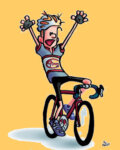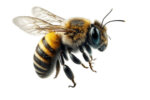Tour de France 2015
Our Community › Forums › General Discussion › Tour de France 2015
- This topic has 95 replies, 20 voices, and was last updated 9 years, 8 months ago by
PotomacCyclist.
-
CreatorTopic
-
June 29, 2015 at 8:29 pm #917025
PotomacCyclist
ParticipantThis year’s race begins on Saturday, July 4th, and continues through Sunday, July 26th.
Chris Froome and Nairo Quintana are among the favorites. Quintana will be the main GC rider for his team, unlike 2013 when Alejandro Valverde was Movistar’s leader.
Among the sprinters, Marcel Kittel will not be racing. His team decided that he didn’t have enough fitness, after suffering from illness earlier this year.
http://www.letour.com/le-tour/2015/us/
-
CreatorTopic
-
AuthorReplies
-
July 13, 2015 at 7:25 pm #1033935
Powerful Pete
Participant@PotomacCyclist 119991 wrote:
Teklehaimanot is riding for MTN-Qhubeka, the first African team to compete in the Tour. He and teammate Merhawi Kudus (the youngest rider overall this year) are the first black Africans ever to ride in the Tour. (Chris Froome was born in Kenya and raised in Kenya and South Africa, but his parents are white English and Froome now rides under a British license.)
This is interesting… I seem to recall that there was a not insignificant North African presence in the TdF during the 50s and early 60s – but were those riders considered French (I think they were mainly Algerians, and as a then French administrative department they may have raced with French passports?
July 13, 2015 at 7:29 pm #1033937mattotoole
Participant@Powerful Pete 120062 wrote:
Picking up a conversation from the start of the TDF thread (I won’t ruin it with spoilers) the female Giro d’Italia (Giro Rosa) ended today. The FB page seems better than the website for info.
https://www.facebook.com/pages/Giro-Rosa-Cycling-Race/1436449503235716?fref=nf
I hate to be a language cop, or to single you out because so many people do it, but could we please say “women’s” instead of “female?”
Anyway thanks for the link.
July 13, 2015 at 7:35 pm #1033938Powerful Pete
ParticipantApologies, it was direct translation from Giro d’Italia Femminile. It is very much the women’s Giro.
Although in curiosity, I would ask how this is a language issue (honest question, not being difficult – English is my second language and one can always learn and improve)?
July 13, 2015 at 7:39 pm #1033939rcannon100
ParticipantMen are men (a noun)
Women are female (an adjective).
or worse
Women are “girls” as they were referred to in the World Cup.
Or
There is (a) cycling (aka men’s cycling) and (b) women’s cycling
Small slips of grammah that reflect bias
July 13, 2015 at 7:56 pm #1033942PotomacCyclist
Participant@Powerful Pete 120063 wrote:
This is interesting… I seem to recall that there was a not insignificant North African presence in the TdF during the 50s and early 60s – but were those riders considered French (I think they were mainly Algerians, and as a then French administrative department they may have raced with French passports?
There is usually a distinction between Arabic North Africans and black sub-Saharan Africans, culturally, racially, historically. Algeria was under French rule until 1962 so those riders probably had French passports and racing licenses. Even apart from that, the history of the two areas of Africa, north and south of the Sahara, have been so different. I think that’s what makes Teklehaimanot’s accomplishment and presence more significant.
Yohann Gène was the first black cyclist in the Tour de France. Many years ago, as in only four years ago (2011). He is from Guadeloupe, a French territory in the Caribbean.
http://content.time.com/time/world/article/0,8599,2082253,00.html
He also had to face some resistance because of his race, in 2011. I believe there was another black rider a couple years ago and he also encountered some racial issues. I don’t think most of the riders are racist but as with any large group of people, there are bound to be a few bad apples.
Aside from that, I think the lack of diversity limits the popularity of the race in some circles. Normally the lack of diversity might actually appeal to certain other individuals, but those people tend not to like anything to do with “Old Europe” or “men in Lycra” or “skinny cyclists” or athletes that aren’t “manly-men” in their view, so they don’t follow the sport.
July 13, 2015 at 8:15 pm #1033943TwoWheelsDC
Participant@PotomacCyclist 120070 wrote:
I think that’s what makes Teklehaimanot’s accomplishment and presence more significant.
Apparently, cycling is HUGE in Eritrea. Say what you will about Patrick Seabase, but he went and rode there and got a huge welcome…and made an interesting mini-documentary (with a brief interview with Daniel Teklehaimanot).
https://www.youtube.com/watch?v=kSU_TJE58kk
July 13, 2015 at 8:42 pm #1033945PotomacCyclist
ParticipantOf note was the history of Marshall “Major” Taylor, an African-American athlete who became one of the earliest champion pro cyclists, in the early days of the “safety bicycle.” Taylor was born in 1878, not long after the safety bicycle was developed. He won U.S. and world sprint bicycle championships and set world records. He competed in Europe in the early 1900s. He faced a lot of resistance in the southern and northern U.S. where he was often not allowed to compete against Caucasian cyclists.
The Tour de France began in 1903 when Major Taylor was still racing and setting world records. I think he was more of a sprinter but he did participate in some six-day races. He was traveling around the world to races, including some in Europe. While France was more accepting of him, Henri Desgrange (credited as the organizer of the first Tour de France) could not bear the thought of Taylor beating the French champion in a bike track race. When Taylor won, Desgrange paid him in small coins, so that Taylor had to carry his winnings off in a wheelbarrow.
Taylor retired in 1905 then returned in 1907. He retired for good in 1910. He lost all of his money in failed business ventures and illness, according to the Major Taylor Association. He stayed at a YMCA in Chicago when he was 51 or 52. He tried to sell his self-published autobiography. He died a couple years later in a charity ward and was buried in an unmarked grave in 1932. In 1948, a group of former pro racers and Schwinn owner Frank Schwinn exhumed his remains and had them reburied in a more prominent part of a cemetery.
======
[The Tour started as a way to sell more newspapers. Desgrange’s paper began during the aftermath of the Dreyfus Affair, when a Jewish French military officer was wrongly convicted of treason. The case deeply divided French society, leading to violence and talk of a civil war. The publisher of the dominant sports newspaper believed Dreyfus was innocent, but his advertisers didn’t agree. So they set up a new sports paper with Desgrange as editor. When that paper didn’t succeed at first, someone suggested to Desgrange that they sponsor a long-distance bicycle race. That turned out to be the Tour de France. The newspaper did not survive WWII but the Tour returned after a multi-year hiatus.]
I skimmed through various sources. I think the info is accurate, but I didn’t have time to fact-check every detail.
http://www.majortaylorassociation.org/biography.htm
http://www.dailypeloton.com/displayarticle.asp?pk=16065
https://en.wikipedia.org/wiki/Marshall_TaylorJuly 13, 2015 at 8:46 pm #1033946PotomacCyclist
ParticipantThe W. Post published an article yesterday about the two Eritrean cyclists at the tour.
Eritrea is a deeply troubled nation, but they have a strong cycling culture. East African countries (like Ethiopia and Kenya) have come to dominate distance running. It’s not hard to imagine that Eritrea and perhaps the other East African nations could produce some top cyclists too.
July 13, 2015 at 10:21 pm #1033956dplasters
Participant@TwoWheelsDC 120071 wrote:
Apparently, cycling is HUGE in Eritrea. Say what you will about Patrick Seabase, but he went and rode there and got a huge welcome…and made an interesting mini-documentary (with a brief interview with Daniel Teklehaimanot).
If I’m honest, I ignored most of the riding (you told me to say what I will!). The Eritrea story is very interesting and the geography is beautiful.
July 14, 2015 at 5:05 pm #1033997PotomacCyclist
ParticipantNo spoilers but today’s stage shook the standings up quite a bit. I won’t post any spoilers about today’s stage until after the primetime broadcast on NBCSN.
July 14, 2015 at 5:18 pm #1033998Powerful Pete
ParticipantYup. Shaking up the standings is a bit of an understatement…
 July 14, 2015 at 5:31 pm #1034000
July 14, 2015 at 5:31 pm #1034000 Steve OParticipant
Steve OParticipantIf you are working late downtown, some friends and I are going to watch the 8pm coverage at The Bottom Line. I’ll probably get there about 6:30-7 to eat dinner. Feel free to drop in.
July 15, 2015 at 12:56 am #1034034 sarahybillingtonParticipant
sarahybillingtonParticipantMore disturbing than the lack of coverage of female amateur/pro cycling is the objectification of male pro cyclists. Is anyone else disturbed that the second most popular Google search for Greipel is “Greipel quads”?
July 15, 2015 at 1:44 am #1034036hozn
Participant@sarahybillington 120170 wrote:
More disturbing than the lack of coverage of female amateur/pro cycling is the objectification of male pro cyclists. Is anyone else disturbed that the second most popular Google search for Greipel is “Greipel quads”?
Wait — have you not seen his quads !!??
To be serious, though, we are talking about sports figures, though, where their bodies — and specifically those massive quads! — is directly relevant to their performance in the sport.
Edit. Attaching the “I’m feeling lucky!” Greipel quads image, so that no one has to google it. Greipel is actually the guy on the left. I know, right !!
[IMG]http://bikearlingtonforum.com/attachment.php?attachmentid=9082&stc=1[/IMG]
July 15, 2015 at 2:52 am #1034037PotomacCyclist
ParticipantBigger is not always better. Greipel is better than the guy on the right. I think the other guy is too focused on muscle mass instead of performance. If you’re not a bodybuilder, you should be more focused on performance as a pro athlete, not mass.
It also looks like they took that well-known photo shortly after a tough workout, when their muscles were pumped. Their muscles won’t be quite as big at rest.
On the other hand, I wonder if there will be Google searches for Froome arms? His arms are looking almost skeletal. I know that the climbers need to cut body fat to reach peak fitness (without hindering performance), but he looks seriously skinny, almost frail and undernourished. Since the results have aired on the NBCSN primetime show, I can post that Froome won the first big mountain stage of this year’s Tour. He put a lot of time between himself and all the main challengers. When he crossed the finish line and raised his arms, I was almost worried that his arms might break off.
Maybe some of the other riders didn’t handle the rest day properly. I know they still ride on the rest days, but they can decide how much intensity to do on the eve of a mountain stage. None of them have done any serious hill climbing in two weeks because of the flat stages so far. So it’s possible that some of the contenders just weren’t on form today. But if they were and they still got destroyed by Froome, then it will be tough for any of them to catch Froome.
Or what if Froome put it all out there today and doesn’t have quite as much left in the subsequent mountain stages? I remember a few years ago when Andy Schleck had a similar outstanding performance on a tough mountain stage. He raced ahead of the field to earn an impressive stage victory. But it seemed like he burned way too many matches in doing that. He was flat in the next few stages and failed to win the Tour when he was so close. I think that was in 2011. He never seriously contended for another Tour win again and ended up retiring last year.
-
AuthorReplies
- You must be logged in to reply to this topic.